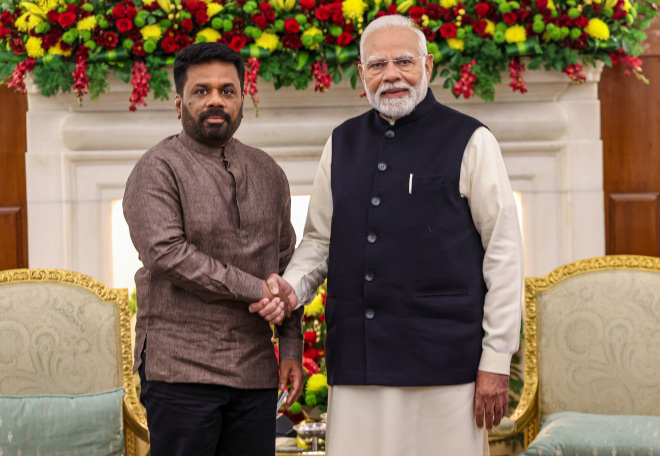WASHINGTON/ BEIJING (PTI): The United States’ commitments to the defence of Japan and the Philippines remain "ironclad," President Joe Biden has said as he launched a new trilateral partnership in the strategic Indo-Pacific with the leaders of the two countries amid their separate territorial disputes with China.
Biden's comments came as he hosted the first-ever trilateral summit between the three countries, welcoming Filipino President Ferdinand Marcos Jr. to the White House a day after the official visit of Japanese Prime Minister Fumio Kishida.
Japan and the Philippines have separate territorial disputes with China. In Tokyo's case, the Senkaku Islands in the East China Sea and in Manila's case, areas of the South China Sea are disputed with Beijing.
Biden also asserted that any attack on Philippine aircraft, vessels or its armed forces in the South China Sea would invoke "our mutual defence treaty".
The visit to Washington by Marcos comes days after Manila accused a Chinese vessel of "highly dangerous manoeuvres" near the Second Thomas Shoal, a disputed maritime region near the Spratly Islands.
The US-Japan-Philippines trilateral comes after the creation of groupings in the Indo-Pacific, starting with the QUAD, comprising India, the US, Australia and Japan, and the AUKUS consisting of Australia, the US and the UK, amid increasing concerns over China's military muscle-flexing in the region.
The US President said "a great deal of history in our world will be written in the Indo-Pacific over the coming years".
"Today we commit to writing that story in the future together to build an Indo-Pacific that is free, open, prosperous and secure for all," Biden said as he described the US, Japan and the Philippines as "three allies, three steadfast partners and three proud democracies".
Biden said among the key areas where the countries are deepening ties are "first, technology and clean energy for securing our semiconductor supply chain".
"From securing our semiconductor supply chain to expanding trusted telecommunications in the Philippines to building a clean energy workforce, to expanding our cooperation across the entire board," the US President said.
"Second, we are deepening our maritime and security ties. I want to be clear, the United States' defence commitments to Japan and the Philippines are ironclad. They're ironclad. As I've said before, any attack on Philippine aircraft, vessels or armed forces in the South China Sea would invoke our mutual defence treaty," he said.
Biden also announced launching an economic corridor in the Philippines as part of the G-7's partnership for global infrastructure and investment.
"This is the first corridor in the Indo-Pacific. It means more jobs for people across the entire region. It means more investment and sectors critical to our future clean energy, ports, railroads, agriculture, and much more," he said.
Japanese Prime Minister Kishida said amid the compound crisis faced by the global community, multi-layered cooperation between allies and like-minded countries is essential if they are to maintain and bolster a free and open international order based on the rule of law.
"Today's meeting will make history as an occasion that significantly pushed forward such an initiative. Japan, the US, and the Philippines are maritime nations connected by the Pacific Ocean and our natural partners. We share fundamental values and principles, and have supported regional economic development," he said.
In his remarks, Philippine President Marcos said, "We meet today as friends and partners bound by a shared vision and pursuit of a peaceful, stable and prosperous Indo-Pacific."
It is a partnership born not out of convenience, nor of expediency, but as a natural progression of a deepening relation and robust cooperation amongst the three countries, linked by a profound respect for democracy, good governance and the rule of law, he said.
"Today's historic summit is a culmination of several preparatory engagements between our foreign ministries, our national security advisors, and our vice ministers, as well as the conduct of trilateral maritime exercises and joint development cooperation. But this meeting can be just a beginning," he said.
Facing the complex challenges of the present time requires concerted efforts on everyone's part, a dedication to a common purpose and an unwavering commitment to the rules-based international order, Marcos said.
"This is a meeting that looks ahead as we deepen our ties and enhance our coordination. We seek to identify ways of growing our economies and making them more resilient, climate-proofing our cities and our societies, sustaining our development progress and forging a peaceful world for the next generation," he said.
The leaders in a joint statement issued later said the "historic" summit is the culmination of decades of partnership and builds on the recent momentum of the three governments' trilateral efforts.
"Our three nations share a firm commitment to a free and open Indo-Pacific that is connected, prosperous, secure, inclusive and resilient. We welcome coordination and cooperation with a wide range of partners who share these goals. In that spirit, we affirm our unwavering support for ASEAN centrality and unity, and the ASEAN outlook on the Indo-Pacific," the joint statement said.
The leaders welcomed efforts to support a peaceful, stable, and rules-based Indo-Pacific region, including from the QUAD, the AUKUS and the US-Japan-Republic of Korea trilateral framework, according to the statement.
Reacting to the trilateral meeting in Washington and the joint statement, China said it strongly opposes the practice of bloc politics by relevant countries.
"We firmly oppose any acts that stoke and drive up tensions and harm other countries’ strategic security and interests. We are seriously against forming exclusive groupings in this region," Chinese foreign ministry spokesperson Mao Ning said in Beijing in response to a question.
"Japan and the Philippines have every right to develop normal relations with other countries, but they should not introduce bloc confrontation into this region, still less engage in trilateral cooperation at the expense of other countries’ interests," she said.
Mao also claimed that China has indisputable sovereignty over Diaoyu Dao (Senkaku Islands) and its affiliated islands and Nanhai Zhudao (the South China Sea Islands).
"Our activities in the East China Sea and South China Sea are lawful, justified and beyond reproach. China does not accept relevant countries’ groundless accusations and deliberate smears against us on the East China Sea and South China Sea," she added.
 Previous Article
Previous Article Next Article
Next Article













The Indian Air Force, in its flight trials evaluation report submitted before the Defence Ministry l..
view articleAn insight into the Medium Multi-Role Combat Aircraft competition...
view articleSky enthusiasts can now spot the International Space Station (ISS) commanded by Indian-American astr..
view article